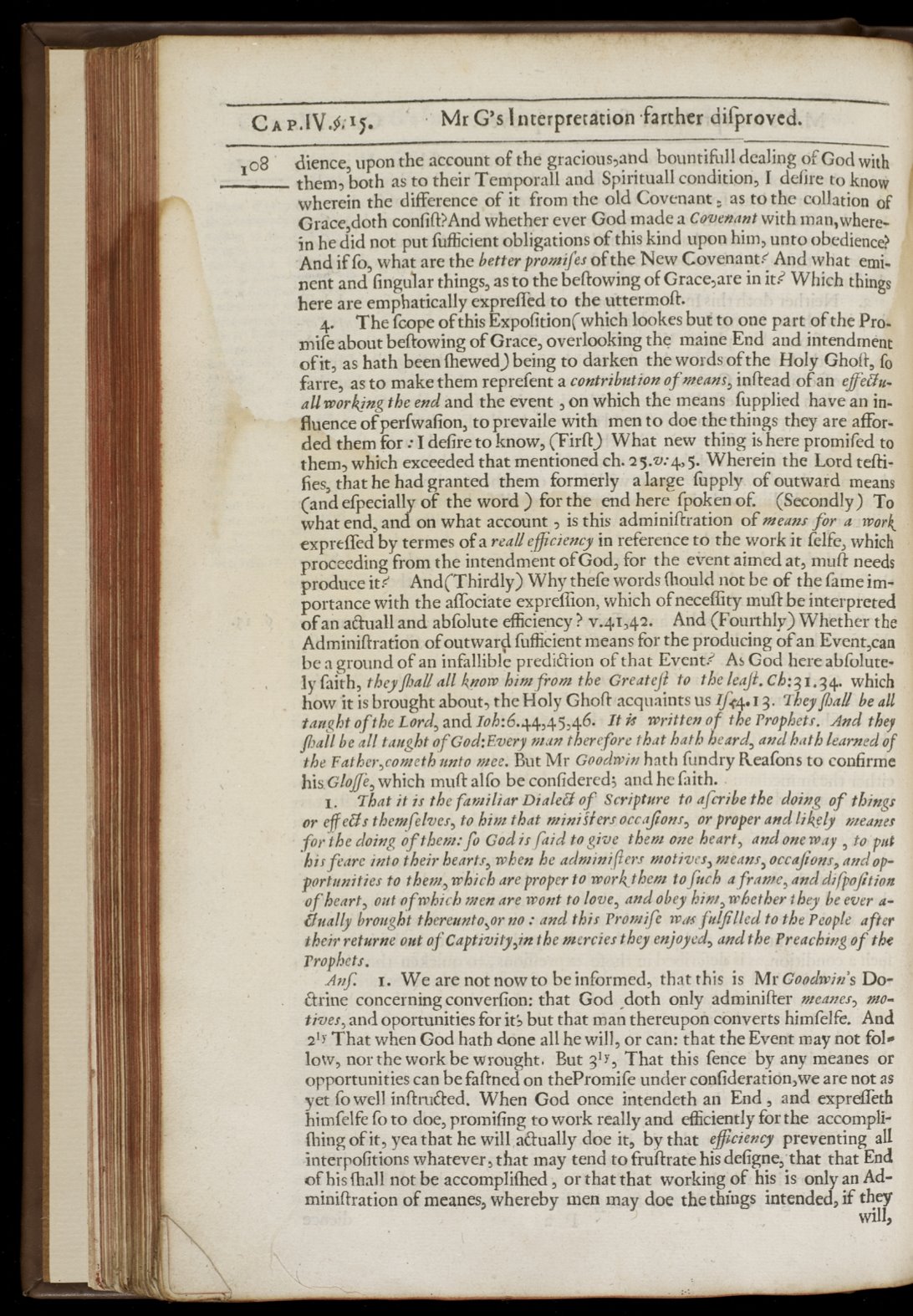

C a
P.IV.4r
1
F,
Mr G's
Interpretation .farthtr
difproved.
1o8
dience, upon
the
account
of
the gracious,and bountifull
dealing
of
God
with
them,
both
as
to their Temporali
and Spirituali condition,
I
defire
to
know
wherein
the
difference
of
it
from
the old
Covenant
, as
to the
collation of
Grace,doth conffl
?And
whether ever God made
a Covenant
with
man,where-
in he
did not put
fufficient
obligations
of
this
kind upon him,
unto
obedience?
And
if
fo,
what
are
the
better
pronsifes
of
the
New
Covenant?
And
what
emi.
nent and
fingular things,
as
to
the
bellowing ofGrace,are
in
it? Which
things
here are emphaticallyexpreffed
to
the uttermoft.
4.
The
fcope
of
this
Expofition(which lookes
but
to
one
part of
the
Pro.
wife about bellowing
of
Grace, overlooking
the
maine End and intendment
of
it,
as
hath
been{hewed)being
to darken the
words
of
the Holy
Ghofl,
fo
farte,
as
to
make
them reprefent
a contribution
of
means,
inflead
of
an
el
eats.
t
all
working the end
and
the
event , on
which
the
means fupplied have an
in-
fluence
ofperfwafion,
to
prevaile with men
to
doe the things
they
are
affor-
ded
them for : I
defire
to
know,
(Firft) What
new
thing
is
here promifed
to
them,
which exceeded
that
mentioned
ch.
25.v:
4,
5.
Wherein the
Lord
tefli-
fies,
that
he
had
granted them
formerly
a
large fupply
of
outward
means
(and
efpecially
of
the word
)
for
the
end here fpoken
of.
(Secondly)
To
what end, and
on
what
account ,
is
this adminiftration
of
means
for
a
work
exprefhed
by termes
of
a
reall
efficiency
in
reference
to
the
work
it
felfe,
which
proceeding from
the
intendment
of
God,
for
the event
aimed
at, mull
needs
produce it?
And(Thirdly)
Why thefewords thould not be
of
the
fame im-
portance
with
the
affociate expreflìon, which
ofneceflìty
muff
be
interpreted
of
an
a
&uall
and
abfolute
efficiency?
v.41,42. And
(Fourthly) Whether
the
Adminiflratíon ofoutwarçl
fufficient
means for
the
producing
of
an Event,can
be
a
ground
of
an infallible
predi
&ion
of
that
Event?
As
God here
abfolute-
ly faith,
they
fhall
all
know
him
from
the
Greatefl
to
the
leafl.
eh :31.34.
which
how
it
is
brought about, the
Holy Ghofl acquaints
us
Ií.4.13.
They
fbaIi
be
all
taught
of
the
Lord,
and Ioh:6.44,45,46.
It
is
written
of
the
Prophets.
And
they
pall
be
all taught
of
God:Every man therefore
that
hath
Beard,
and hath
learned of
the Father,cometh unto
mee.
But
Mr
Goodwin
bath fundry Reafons
to
confirme
his. Gloffe,
which muff alto
be
confidered; and he faith.
x.
That
it
is
the
familiar Dialed
of
Scripture
to
afcribe
the
doing
of
things
or
elf
ells
themfelves,
to
him
that
mini
it
f
ers
occafons, or proper
and
likely
meaner
for the
doing
of
them:
fo
God is
faid
to
give them
one
heart, and
one way to
put
hisfeare into their
hearts,
when he
admini
flers
motives, means,
occafions,
andop-
portunities
to
them, which
are properto
workthem
to
fuch
a
frame, and
difpofition
of
heart,
out
o
fwhich
men
are
wont
to
love,
and
obey
him, whether
they
be
ever
a-
llually
brought
thereunto,orno: and this
Promifè
was
fulfilled
to
the
People
after
their
returne
out
of
Captivity,in
the mercies
they enjoyed,
and
the Preaching
of
the
Prophets.
Anf.
1.
We
are
not
now
to
be informed,
that
this
is
Mr
Goodwin's
Do-
.
&tine concerning
converfion:
that
God
Both
only adminiffer
meanes,
mo-
tives,
and oportunities for
it',
but that
man
thereupon cònverts
himfelfe. And
2'z
That
when God bath done all he will,
or
can:
that the
Event
may
not
fol.
low, nor the
work be wrought.
But
31Y,
That
this
fence
by
any meanes
or
opportunities
can
be fafined
on
thePromife under confideration,weare not
as
yet
Powell
inflru&ed.
When God once intendeth
an
End,
and
expreffeth
himfelfe
fo
to
doe, promifing
to
work really
and
efficiently
for the
accompli-
Thing
of
it,
yea
that
he
will, a&ually
doe
it,
by
that
efficiency
preventing
all
interpofitions
whatever,
that
may
tend
to
frufirate
his
defigne,
that
that
End
of
his[hall
not be accomplifhed, or
that that
working
of
his is
only
an
Ad-
miniflration
of
meanes,
whereby
men may
doe the
things
intended,
if
they
will,










